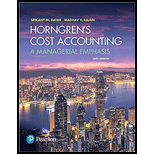
Transfer pricing, goal congruence, ethics. Cocoa Mill Chocolates manufactures specialty chocolates and sells them to fine candy stores. The company operates two divisions, cocoa and candy, as decentralized entities. The cocoa division purchases raw cacao beans and processes them into cocoa powder. The candy division purchases cocoa powder and other ingredients and uses them to produce gourmet chocolates. The cocoa division is free to sell processed cocoa to outside buyers, and the candy division is free to purchase processed cocoa from other sources. Currently, however, the cocoa division sells all of its output to the candy division, and the candy division does not purchase materials from outside suppliers.
The processed cocoa is transferred from the cocoa division to the production division at 110% of full cost. The cocoa division purchases raw cacao beans for $4 per pound. The cocoa division uses 1.25 pounds of raw cacao beans to produce one pound of processed cocoa. The division’s other variable costs equal $1.25 per pound of output, and fixed costs at a monthly production level of 20,000 pounds of cocoa are $0.75 per pound. During the most recent month, 20,000 pounds of processed cocoa were transferred between the two divisions. The cocoa division’s capacity is 25,000 pounds of output.
With the increase in demand for dark chocolate, the candy production division expects to use 22,000 pounds of cocoa next month. Franklin Foods has offered to sell 2,000 pounds of cocoa next month to the candy production division for $7.50 per pound.
- A. Compute the transfer price per pound of processed cocoa. If each division is considered a profit center, would the candy production manager choose to purchase 2,000 pounds next month from Franklin Foods?
- B. What would be the cost to Cocoa Mill Chocolates if the 2,000 pounds had been produced by the cocoa division and transferred to the candy division? Is the external purchase in the best interest of Cocoa Mill Chocolates? What is the cause of this goal incongruence?
- C. The candy division manager suggests that $7.50 is now the market price for processed cocoa, and that this should be the new transfer price. Cocoa Mill’s corporate management tends to agree. The cocoa division manager is suspicious. Franklin’s prices have always been much higher than $7.50 per pound. Why the sudden price cut? After further investigation by the cocoa division manager, it is revealed that the $7.50 per pound price was a one-time-only offer made to the candy division due to excess inventory at Franklin.
Future orders would be priced at $8.00 per pound. Comment on the validity of the $7.50 per pound market price and the ethics of the candy manager. Would changing the transfer price to $7.50 matter to Cocoa Mill Chocolates?
Want to see the full answer?
Check out a sample textbook solution
Chapter 22 Solutions
EBK HORNGREN'S COST ACCOUNTING

 AccountingAccountingISBN:9781337272094Author:WARREN, Carl S., Reeve, James M., Duchac, Jonathan E.Publisher:Cengage Learning,
AccountingAccountingISBN:9781337272094Author:WARREN, Carl S., Reeve, James M., Duchac, Jonathan E.Publisher:Cengage Learning, Accounting Information SystemsAccountingISBN:9781337619202Author:Hall, James A.Publisher:Cengage Learning,
Accounting Information SystemsAccountingISBN:9781337619202Author:Hall, James A.Publisher:Cengage Learning, Horngren's Cost Accounting: A Managerial Emphasis...AccountingISBN:9780134475585Author:Srikant M. Datar, Madhav V. RajanPublisher:PEARSON
Horngren's Cost Accounting: A Managerial Emphasis...AccountingISBN:9780134475585Author:Srikant M. Datar, Madhav V. RajanPublisher:PEARSON Intermediate AccountingAccountingISBN:9781259722660Author:J. David Spiceland, Mark W. Nelson, Wayne M ThomasPublisher:McGraw-Hill Education
Intermediate AccountingAccountingISBN:9781259722660Author:J. David Spiceland, Mark W. Nelson, Wayne M ThomasPublisher:McGraw-Hill Education Financial and Managerial AccountingAccountingISBN:9781259726705Author:John J Wild, Ken W. Shaw, Barbara Chiappetta Fundamental Accounting PrinciplesPublisher:McGraw-Hill Education
Financial and Managerial AccountingAccountingISBN:9781259726705Author:John J Wild, Ken W. Shaw, Barbara Chiappetta Fundamental Accounting PrinciplesPublisher:McGraw-Hill Education





